I'm a Nutritionist and Here Are 25 Weight Loss Truths You Need to Hear
Stepping on the scale can be a daunting experience for many of us. Whether you're just starting your weight loss journey or looking to shed those last few stubborn pounds, the path to a healthier you is often paved with questions. To help clear the confusion, we've consulted top dietitians Chrissy Arsenault and Danielle Rancourt to answer the most common weight loss questions people ask. From understanding body fat to debunking exercise myths, this comprehensive guide will equip you with the knowledge you need to achieve your weight loss goals.
What is body fat and why is it important?

Body fat plays a crucial role in our overall health. Chrissy Arsenault, Registered Dietician at Trainer Academy, explains, "Body fat refers to connective tissue in your body, found under your skin and as a protective layer around organs. It sends signals throughout the body, stores and releases energy, provides insulation, and helps regulate hormones."
Arsenault emphasizes the importance of balance, stating, "Body fat management is important for overall health because too much body fat is linked to metabolic disease and obesity, while too little body fat can affect basic hormonal signaling in your body (especially for women). So, a balanced body fat percentage is ideal."
What's the difference between losing weight and losing body fat?
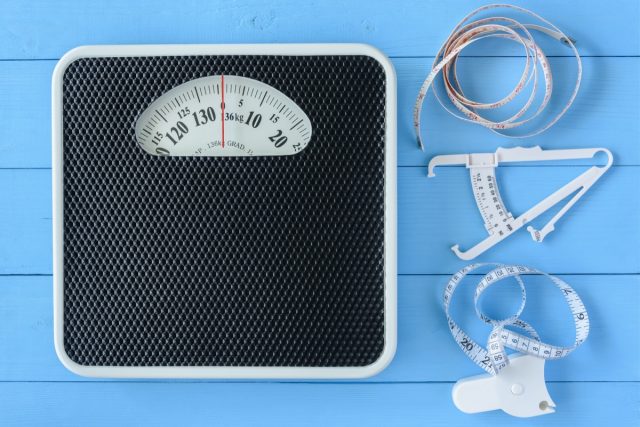
Many people confuse weight loss with fat loss, but they're not the same thing. Arsenault clarifies, "Losing weight refers to the loss of body mass from water, muscle, and/or fat. Losing body fat focuses on reducing adipose tissue without losing muscle to achieve a leaner look and achieve a lower body fat percentage."
She adds, "Additionally, losing body fat may not necessarily result in weight loss – I often work with clients on body recomposition, where you may see lower body fat but maintain or gain muscle to maintain your current weight."
How does the body store and burn fat?
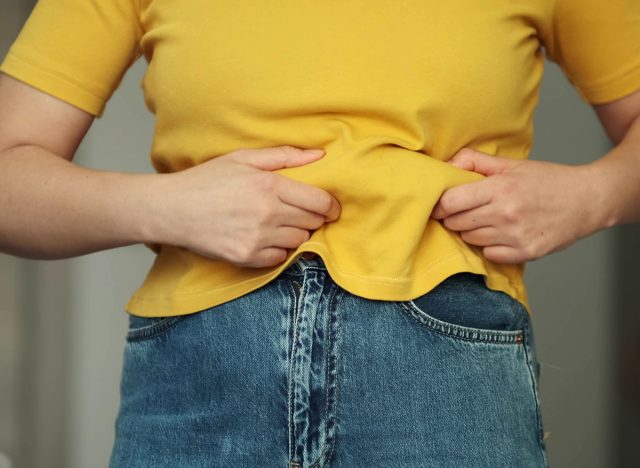
Understanding how our bodies handle fat is key to effective weight management. Arsenault explains, "Our bodies typically maintain a healthy supply of fat to maintain essential bodily functions. When you consume extra calories than you need, your body stores fat in adipose tissue to use in case it needs it later. Conversely, when you expend energy and there isn't enough glucose to go around (glucose is typically the preferred source of energy), fat is burned as the source of fuel."
What factors affect an individual's ability to lose body fat?

Fat loss isn't a one-size-fits-all process. Arsenault points out, "Some key factors that can affect an individual's ability to lose fat include genetics, sex (it's harder for women to lose body fat than men, and women need to maintain a higher body fat percentage for hormonal reasons!), age, metabolism, hormone levels, diet, physical activity levels, and lifestyle habits."
How significant is diet in the process of losing body fat?
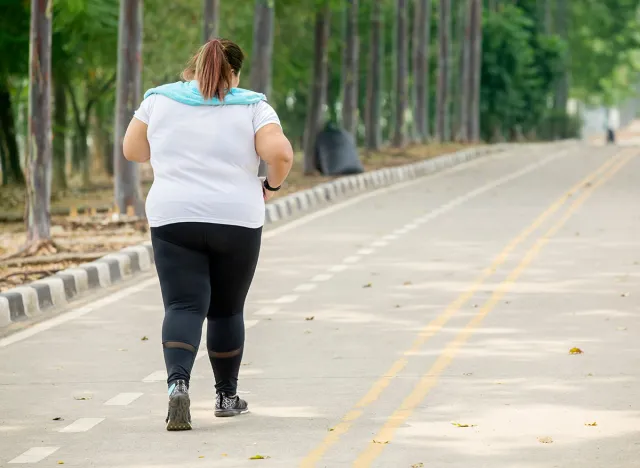
When it comes to fat loss, diet plays a starring role. Arsenault emphasizes, "Diet plays a more significant role in the process of losing fat than even exercise! Food is fuel, and having a balanced diet than can help you feel your best while losing weight or body fat is an important strategy in your health journey if you're looking to lose fat."
What are the optimal nutritional strategies for fat loss?

Arsenault recommends a balanced approach to nutrition for fat loss. "A nutrient-dense, balanced diet is optimal for losing body fat, but this guidance is no different than what I'd recommend to a client who isn't focused on losing body fat in particular," she says.
She advises, "Focus on consuming lean proteins with every meal (at least 20-30 grams at each meal), eat plenty of non-starchy vegetables (incorporate 2-3 colors of veggies at each meal), and drink plenty of water! I also typically recommend eating 2-3 meals per day and 1-2 snacks so that you aren't hungry throughout the day."
How does calorie deficit work, and what's the safest way to achieve it?
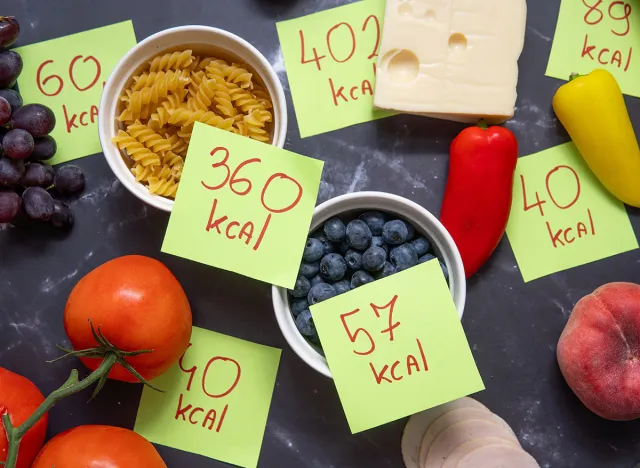
A calorie deficit is a fundamental concept in weight loss. Arsenault explains, "Calorie deficit means taking in fewer calories than you're using. For each 3,500 calories you achieve in deficit, you would lose a pound. It's the fundamental math behind weight loss."
She adds, "The safest and most effective way to achieve calorie deficit is through a combination of reducing calories from food and adding in physical activity to help burn calories. It can often be difficult to achieve calorie deficit from diet alone (plus, there are many other health benefits of exercise!)."
Are there specific foods or nutrients that can aid in losing body fat?
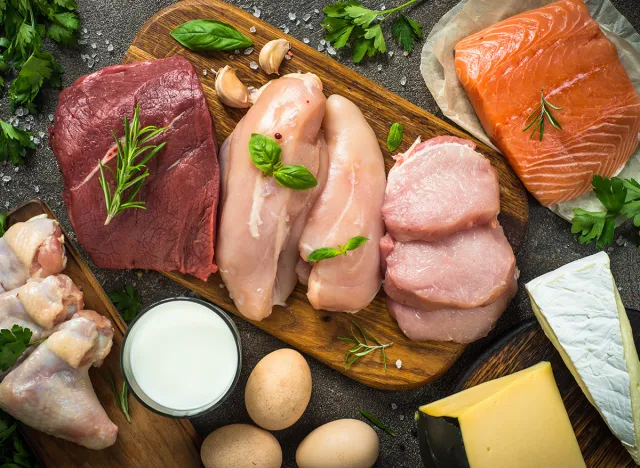
While there's no magic food for fat loss, certain nutrients can be beneficial. Arsenault recommends, "Protein (lean meats, tofu, lentils, Greek yogurt, cottage cheese, etc.) and fiber (veggies, fruit, whole grains) in combination can help you stay full and lose fat without feeling deprived. Healthy fats can also be helpful, as long as the sources are mostly plant-based – such as avocados."
What role does exercise play in losing body fat, and which types are most effective?
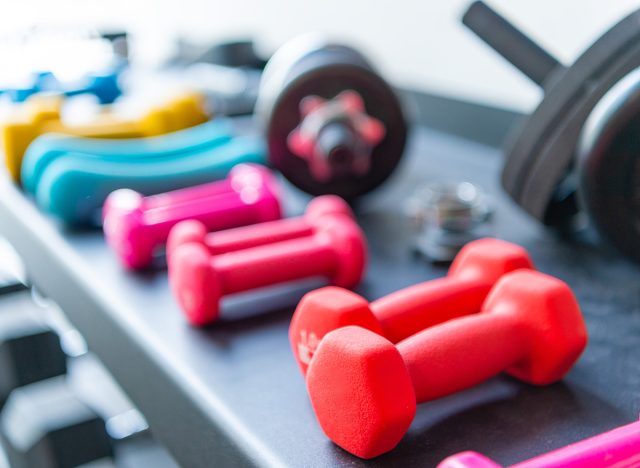
Exercise is a crucial component of any fat loss plan. Arsenault explains, "Exercise plays a role in fat loss by helping to burn calories and train your muscles. Strength training (lifting weights) is often the most effective for burning fat and maintaining/gaining muscle, but the individual would still need to achieve a calorie deficit if they'd like to lose weight along with fat loss or calorie maintenance if they'd like to achieve a more lean appearance without losing body mass."
She adds, "Additionally, high-intensity interval training (HIIT) cardio can be effective for fat loss, versus longer periods of light intensity cardio. However, if you're just getting started with any exercise, anything helps – even a light uphill walk!"
RELATED: This Plan Is How to Lose 5 Percent Body Fat In 2 Weeks
How should one balance cardio and strength training for optimal fat loss?
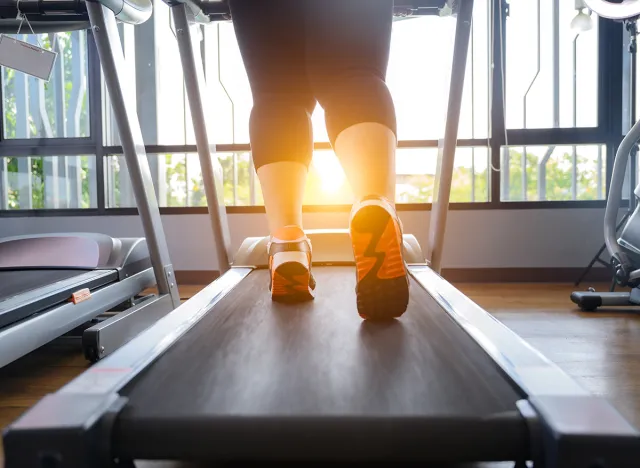
Finding the right balance between cardio and strength training is key. Arsenault advises, "Both go hand in hand when it comes to optimal fat loss. While many coaches and trainers recommend long hours of cardio, I actually recommend short, 15-30 minute high-intensity interval training (HIIT) sessions to start, complemented by longer periods of strength training."
What are some common exercise myths related to fat loss?

Misconceptions about exercise can hinder fat loss progress. Arsenault debunks two common myths: "I think the biggest exercise myth related to fat loss is spot targeting fat loss! Unfortunately, as much as we'd love to, we can't specifically target areas that typically accumulate fat like hips or belly. While exercises can help you build muscle around an area with looser skin, you can't target fat in specific areas."
She adds, "Another myth I typically hear from my clients is that lifting weights will make them bulky – especially women. In fact, lifting heavy weights helps my female clients achieve a much more 'toned' appearance – and I promise it won't make women look bulky or manly at all! Strength training will help accentuate your natural curves."
What lifestyle factors contribute to body fat loss?

Fat loss isn't just about diet and exercise. Arsenault points out, "Getting enough sleep and managing stress appropriately are important for body fat loss. Additionally, limiting excessive alcohol intake can be helpful, since alcohol consumption can affect the body's ability to burn fat."
RELATED: The Ultimate Guide to Getting Fit as a Pear Body Type
How do sleep and stress management impact body fat levels?

Sleep and stress play a significant role in fat loss. Arsenault explains, "Not getting enough sleep and experiencing chronic stress can trigger release of cortisol in the body, also known as the stress hormone. When chronically elevated, cortisol levels can promote overeating and accumulation of fat. Conversely, lower levels of cortisol may be more beneficial in supporting fat loss."
Are there any advanced techniques or technologies that help in losing body fat?

For those looking to take their fat loss journey to the next level, Arsenault mentions, "Metabolic testing monitors and analyzers can help measure an individual's specific basal metabolic rate (BMR), to help guide diet and exercise plans. While there are calculations that can estimate an individual's metabolism, these more advanced tools can be helpful for a coach in being able to develop a plan to lose body fat for their client."
How can individuals tailor their fat loss plan to their body type or metabolic rate?

Personalization is key in fat loss. Arsenault advises, "There really isn't science behind tailoring a fat loss plan to different body types, despite the buzz that's out there. However, we can certainly tailor fat loss plans to metabolic rates as mentioned above. There are tools to help measure basal metabolic rate (BMR), which we can adjust diet plans, exercise, and macronutrients around."
What are common challenges or plateaus people face when trying to lose body fat?

Fat loss journeys often come with obstacles. Arsenault notes, "Common challenges include metabolic adaptation, weight loss/fat loss plateaus, loss of weight loss but no change in body fat percentage, and lack of adherence to lifestyle changes. While it's easier for individuals to lose weight, much of initial weight loss is water weight loss or even muscle loss, so it's more challenging to see fat loss."
RELATED: 12-3-30 Walking Method: 20 Proven Tips to Lose Weight Faster
How can someone overcome a weight loss plateau?

Plateaus are a common hurdle in weight loss. Arsenault suggests, "Some ways in which I work with clients to overcome a weight loss plateau is by introducing a refeeding period where they add calories and carbs back into their diet (maintenance calories) until they physically and mentally feel prepared to resume a reduction in calories to achieve weight loss. Our bodies can't constantly be in deficit mode! We could also look at changing exercise routines to incorporate more strength training and high-intensity interval training (HIIT), which can promote more fat loss than cardiovascular activities like walking."
How can individuals maintain their body fat loss over the long term?

Maintaining fat loss is just as important as achieving it. Arsenault advises, "Individuals should focus on maintaining the healthy habits that helped them achieve their body fat loss in the first place. As long as those habits are maintained, and individuals monitor their weight and body fat percentage on a regular basis without checking in too often, it should be manageable to maintain body fat loss over the long term!"
What are the key components of a sustainable fat loss strategy?

Sustainability is crucial for long-term success. Arsenault recommends, "A nutrient-dense diet that's rich in protein, exercise including strength/resistance training, and maintaining a healthy lifestyle (minimizing stress & sleep) are important components of a sustainable fat loss strategy. Also, flexibility is key. No one can adhere to a rigid diet or exercise plan forever. I recommend my clients to give themselves some grace in the process once they've achieved their initial milestones – the 80/20 eating pattern, for example, can be helpful for someone looking to sustain their fat loss so that they can go enjoy their lives with friends and family without compromising the results they've worked so hard for!"
What is your top advice for someone starting their body fat loss journey?

For those just beginning their fat loss journey, Arsenault offers encouragement: "You may not see results right away but don't give up and celebrate the small victories along the way. Rather than focusing on the number on the scale, focus on taking weekly pictures of yourself and measure key body parts (bust, hip, waist, arm) to see the great progress you're making. Also, don't be afraid to ask for help – a registered dietitian can help you with your diet and a certified personal trainer (CPT) will be able to help come up with an exercise plan for you!"
RELATED: Benchmark Your Progress with Our Lean Body Mass Calculator
Can you share a success story of someone who has successfully lost body fat?

Success stories can be inspiring. Arsenault shares, "One of the ladies I've worked with (let's call her Emily) had been doing 1-2 hours of cardio on her treadmill and elliptical daily and was severely restricting her calories at 1,000 calories a day to the point where she felt miserable! She came to me because she didn't want to be 'skinny fat' anymore. She was already at a healthy body mass index (BMI) but she had been scared to pick up weights in fear that she'd look like a bodybuilder!"
She adds, "We worked on dispelling myths and reintroducing more foods to get her metabolism back to a healthy level through eating small, frequent meals throughout the day with a lot more protein and whole foods (rather than 'sugar-free' or 'diet' foods). Instead of hours of cardio and sit-ups, we switched over to high-intensity interval training (HIIT) for just 15-30 minutes a day. Within a couple of months, Emily had gained more muscle mass, lost fat, and felt great without having to spend so much time doing cardio or eat 'diet foods' all the time. Beyond her new and improved lean physique, I was SO happy to see Emily's boost in confidence – she learned to love her body and appreciate balance along the way."
How does obesity affect sleep quality?

Danielle Rancourt, Registered Dietitian at Pivot Nutrition, explains the relationship between obesity and sleep: "People who are obese are more likely to report trouble sleeping than those who are not obese. There is evidence to suggest that obesity is associated with fatigue. Researchers suggest that obesity may change metabolism and/or sleep-wake cycles in such a way that causes sleep quality to deteriorate. It's also possible that there are physical effects of carrying excess weight itself which impact sleep quality."
How does sleep affect weight loss efforts?

Rancourt emphasizes the importance of sleep in weight management: "Inadequate sleep impacts appetite-regulating hormones (leptin and ghrelin) in a way that promotes cravings and overeating, which can result in weight gain. In simple terms, if you're not getting enough sleep, ghrelin, the hunger hormone, goes up and Leptin, the appetite suppressing hormone, goes down, creating increased hunger, making it more difficult to lose weight." She adds, "Adults who do not get sufficient sleep also tend to exercise less than those who do, likely because inadequate sleep causes daytime fatigue and sleepiness, reducing motivation for exercise."
What's your top 'fat loss hack'?

Rancourt offers a simple yet effective tip: "People often ask 'do you have any fat loss hacks or fat loss tips?' Yup. Go to bed early! Sleep is one the most underrated tools to promote health and fat loss."
RELATED: 3 Easy Dinner Recipes That Helped Me Lose 40 Pounds
What's the fundamental principle behind weight loss?
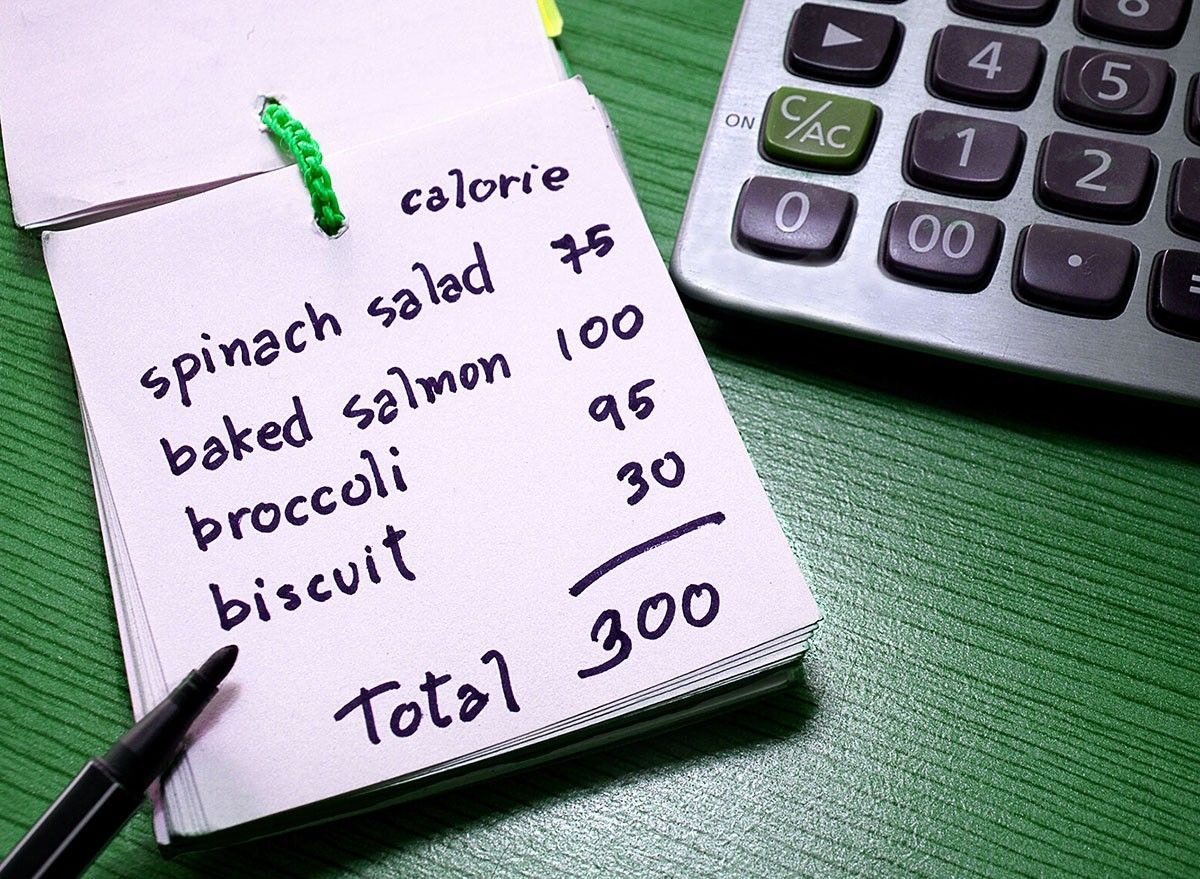
Rancourt simplifies the core concept of weight loss: "In order to lose weight, there needs to be a calorie deficit. Calorie deficit = low energy availability."
To conclude, Arsenault offers these words of encouragement: "Focus on making changes through body fat loss because you LOVE your body, not because you hate your body. Love your body today as much as you'll love it when you're at a lower body fat and remember that your self-worth is NOT tied to how you look. How you feel throughout the process is also important. Depriving yourself is not worth it if you feel crummy. You should be able to balance eating foods you like with foods that provide you with fuel. Surround yourself with other like-minded people, but don't feel obligated to share your journey with those who won't support you (or people who have the best intentions but make comments that don't sit well with you)."
It's important to remember that your weight loss journey is unique to you. Armed with these expert insights, you're now better equipped to make informed decisions about your health and body. Stay patient, persistent, and kind to yourself as you work towards your goals. And if you enjoyed this article, take advantage of these 15 Quick Ways to Lose Body Fat Percentage in a Week.





